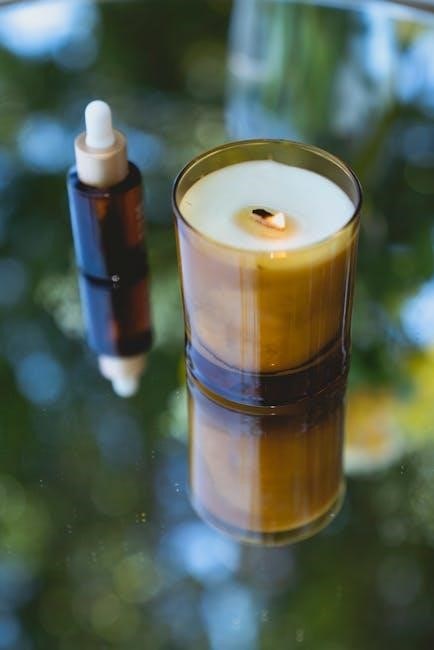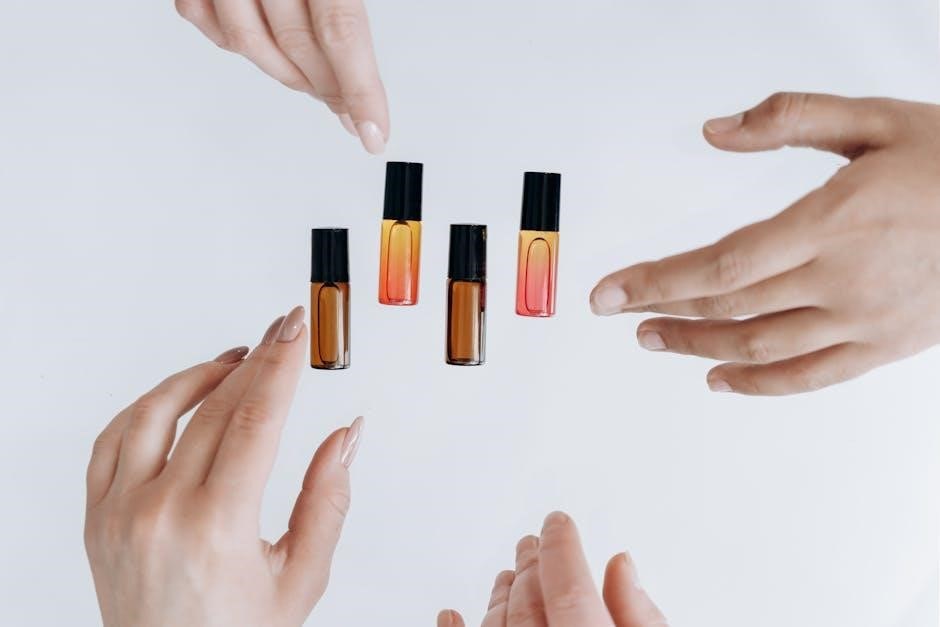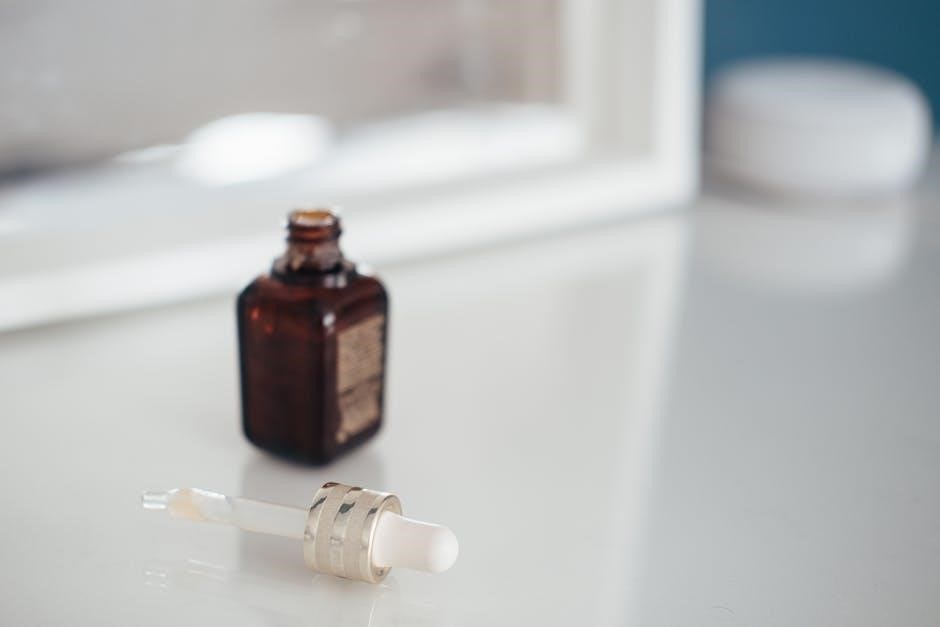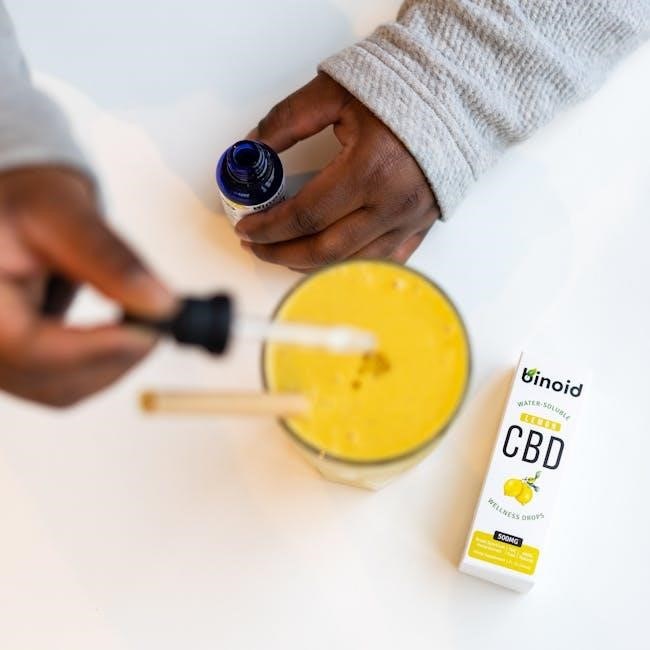Essential oils are natural extracts from plants, offering versatile benefits for physical, emotional, and mental well-being. Popular in holistic wellness, they provide therapeutic properties for various uses, from aromatherapy to natural remedies, making them a valuable addition to daily life.
Overview of Aromatherapy and Its Benefits
Aromatherapy is a holistic practice that harnesses the therapeutic properties of essential oils to promote physical, emotional, and mental well-being. By inhaling or applying these oils, individuals can experience benefits such as stress relief, improved mood, and enhanced relaxation. Aromatherapy works by stimulating the brain’s limbic system, which processes emotions and sensory responses, allowing the oils to influence mood and emotional balance.
Regular use of essential oils in aromatherapy can also support respiratory health, reduce inflammation, and improve sleep quality. Additionally, it offers natural solutions for pain management, skin care, and even household cleaning. With its versatility and natural origins, aromatherapy has become a popular alternative to conventional treatments, offering a wide range of benefits for overall wellness.

Essential Oils and Their Uses
Essential oils are versatile natural extracts with wide-ranging applications, from aromatherapy and skincare to pain relief and household cleaning. Their unique properties make them a popular choice for holistic wellness.
Lavender Oil: Benefits and Applications
Lavender oil, derived from the Lavandula angustifolia plant, is renowned for its calming and therapeutic properties. It promotes relaxation, improves sleep quality, and soothes anxiety. Known for its gentle, floral scent, lavender oil is often used in skincare to treat acne, sunburn, and minor wounds due to its antiseptic and anti-inflammatory effects. It can be applied topically, inhaled through aromatherapy, or added to bathwater for a soothing experience. Additionally, lavender oil is a natural insect repellent and can freshen the air in homes. Its versatility makes it a popular choice for both personal care and household use. Always dilute lavender oil with a carrier oil before skin application and consult a professional for safe usage, especially for children or during pregnancy.
Tea Tree Oil: Antimicrobial and Antiseptic Properties
Tea Tree Oil, extracted from Melaleuca alternifolia, is celebrated for its potent antimicrobial and antiseptic properties. It is widely used to treat skin infections, acne, and minor wounds, effectively combating bacteria, viruses, and fungi. Its ability to reduce inflammation and prevent infection makes it a staple in natural first aid kits. Additionally, Tea Tree Oil is valued for its decongestant properties, aiding in respiratory relief when inhaled. It is also used in oral care for its antibacterial effects, helping to freshen breath and reduce plaque. For safe use, always dilute Tea Tree Oil with a carrier oil and avoid ingestion. Its versatility and efficacy make it a popular natural remedy for various health and hygiene needs, while its strong scent is both refreshing and invigorating, enhancing overall well-being with each application.
Eucalyptus Oil: Respiratory Support and Pain Relief
Eucalyptus Oil, derived from the leaves of the Eucalyptus globulus tree, is renowned for its respiratory support and pain-relieving properties. Its refreshing, menthol-like aroma helps clear mucus and congestion, making it ideal for alleviating symptoms of colds, bronchitis, and sinusitis. When inhaled, it acts as a natural decongestant, promoting easier breathing and relieving coughs. Additionally, Eucalyptus Oil is effective in soothing sore muscles and joints, reducing inflammation and pain when applied topically. It is also used to ease digestive discomfort and nausea. Its invigorating scent can boost mental clarity and energy levels, making it a popular choice for aromatherapy. For safe use, dilute Eucalyptus Oil with a carrier oil and avoid direct contact with sensitive areas. Its versatility in addressing both physical and respiratory issues makes it a must-have in natural health routines, offering relief and renewal with each application.
Chamomile Oil: Soothing Effects for Skin and Mood
Chamomile Oil, extracted from the flowers of the Matricaria chamomilla plant, is celebrated for its calming and soothing effects on both the skin and emotions. Its gentle, herbal aroma makes it a natural remedy for irritated skin, reducing inflammation and promoting healing in cases of burns, eczema, and acne. Chamomile Oil is also a powerful mood stabilizer, helping to alleviate stress, anxiety, and insomnia. When used in aromatherapy, it fosters relaxation and emotional balance, creating a sense of calm. It is often incorporated into skincare routines for its ability to soothe sensitive skin and reduce redness. Additionally, Chamomile Oil can be used to ease menstrual cramps and digestive discomfort. For safe use, dilute it with a carrier oil and avoid applying it to broken skin. Its versatility in addressing both physical and emotional discomfort makes it a cherished natural remedy for overall well-being and relaxation.
Bergamot Oil: Uplifting Scent and Therapeutic Uses
Bergamot Oil, derived from the rind of bergamot oranges, is renowned for its fresh, citrusy scent and uplifting properties. It is widely used in aromatherapy to reduce stress and anxiety, promoting a sense of calm and joy. Bergamot Oil has natural mood-enhancing abilities, making it an effective remedy for emotional well-being. Its antiseptic and anti-inflammatory properties make it beneficial for skin care, treating issues like acne, wounds, and eczema; It also helps balance oily skin and reduces the appearance of scars. Bergamot Oil can be used in diffusers to purify the air and uplift the atmosphere. When applied topically, it should be diluted with a carrier oil to avoid skin irritation. Its versatility in addressing both emotional and physical health makes it a popular choice for natural wellness practices.
Frankincense Oil: Anti-Inflammatory and Calming Effects
Frankincense Oil, extracted from the resin of Boswellia trees, has been valued for centuries for its medicinal and spiritual properties. Known for its woody, earthy aroma, it is widely used in aromatherapy to promote relaxation and reduce anxiety. Frankincense Oil has potent anti-inflammatory and anti-aging properties, making it beneficial for skin health, particularly in treating wounds, scars, and reducing signs of aging. It is also known to alleviate joint pain and improve respiratory health by reducing inflammation. Frankincense Oil can be diffused to create a calming atmosphere, promoting deep breathing and mental clarity. When applied topically, it is often mixed with carrier oils like coconut or jojoba oil. Its ability to soothe both the mind and body makes it a staple in natural wellness and therapeutic practices.
Peppermint Oil: Digestive Aid and Energy Boost
Peppermint Oil, derived from the leaves of the Mentha piperita plant, is renowned for its invigorating scent and numerous health benefits. It is a natural digestive aid, often used to alleviate nausea, bloating, and indigestion. Peppermint Oil can be ingested in small amounts or applied topically to the abdomen for relief. Its cooling properties also make it effective in soothing muscle aches and headaches. When inhaled, it provides an energy boost, enhancing mental focus and alertness, making it ideal for combating fatigue. Peppermint Oil is also known to freshen breath and can be incorporated into oral care routines. Its versatility makes it a popular choice for both therapeutic and everyday uses, offering a natural solution for various health concerns while promoting overall well-being.

Safety Guidelines for Using Essential Oils
Always dilute essential oils with a carrier oil before skin application. Perform patch tests to avoid allergic reactions. Avoid sensitive areas and use as directed. Consult a professional for safe usage, especially for children, pregnant women, or those with medical conditions.

Proper Dilution and Application Methods
Proper dilution is crucial for safe essential oil use. Typically, a 1-3% dilution rate is recommended, meaning 5-15 drops per teaspoon of carrier oil. Always perform a patch test on a small skin area before widespread use. For topical application, mix with carriers like coconut or jojoba oil to prevent irritation. Avoid applying undiluted oils to sensitive areas or broken skin. For aromatic use, diffuse oils in well-ventilated spaces. Never ingest essential oils without professional guidance. Store oils in dark bottles and keep them out of reach of children. Proper methods ensure effectiveness while minimizing risks, making essential oils a safe and beneficial addition to daily routines.

Essential Oil Blending for Enhanced Benefits
Blending essential oils can amplify their therapeutic effects, creating synergies that enhance physical and emotional well-being. Start by choosing a base note oil, like frankincense or sandalwood, for its grounding properties. Add middle notes, such as lavender or chamomile, to balance and harmonize. Top notes, like bergamot or lemon, provide uplifting and refreshing scents. Consider the intended use, such as relaxation or energy, when selecting oils. Always dilute blends with a carrier oil for safe application. Experiment with small batches to find combinations that suit your needs. Proper blending techniques ensure that each oil’s unique benefits are maximized, offering personalized solutions for health and wellness.


Essential Oils for Specific Needs
Essential oils cater to diverse requirements, offering natural solutions for physical health, emotional well-being, and household purposes. They provide targeted benefits, making them a versatile choice for various needs.
Physical Health: Pain Relief, Antiseptic Uses
Essential oils are renowned for their ability to support physical health, offering natural solutions for pain relief and antiseptic purposes. Oils like lavender and tea tree are widely used for their analgesic and antimicrobial properties, helping to soothe muscle aches and prevent infections. Eucalyptus oil is particularly effective for respiratory issues, easing congestion and coughs, while frankincense is known for its anti-inflammatory effects. These oils can be applied topically, often diluted with carrier oils, to provide localized relief. Additionally, their antiseptic properties make them ideal for cleaning minor wounds, promoting healing without harsh chemicals. By incorporating these oils into daily routines, individuals can harness their therapeutic benefits to maintain optimal physical well-being naturally.
Emotional Well-being: Stress Relief and Mood Enhancement
Essential oils play a significant role in enhancing emotional well-being by providing natural stress relief and uplifting moods. Oils such as lavender and chamomile are known for their calming effects, helping to reduce anxiety and promote relaxation. Bergamot oil, with its citrus scent, is often used to alleviate stress and improve mood, while frankincense supports emotional balance and mindfulness. These oils can be inhaled directly, used in diffusers, or incorporated into bath routines to create a soothing environment. Their ability to influence emotional states makes them a popular choice for managing daily stress and fostering a sense of calm and well-being. Regular use can lead to improved mental clarity and a more positive outlook on life.
Household Uses: Natural Cleaning and Air Purification

Essential oils are versatile natural agents for household cleaning and air purification, offering a chemical-free alternative for a healthier home. Oils like lavender and lemon possess antimicrobial properties, making them ideal for disinfecting surfaces and eliminating odors. Tea tree oil, known for its antiseptic qualities, is effective in cleaning bathrooms and kitchens. Eucalyptus oil can freshen the air and repel pests, while peppermint oil invigorates the atmosphere and naturally deter insects. These oils can be mixed with water or vinegar for cleaning solutions or diffused to purify the air. Their pleasant scents not only enhance the home environment but also promote a sense of well-being. Using essential oils for household tasks supports a sustainable and toxin-free lifestyle, making them a practical choice for everyday cleaning and air freshening needs.
Essential oils offer a natural, holistic approach to health, wellness, and household needs, providing versatile solutions that enhance physical, emotional, and environmental well-being with their therapeutic properties.
Summarizing the Power of Essential Oils
Essential oils are versatile natural extracts offering therapeutic benefits for physical, emotional, and mental well-being. From aromatherapy to natural remedies, they provide solutions for various health concerns. Popular oils like lavender, tea tree, and eucalyptus are known for their calming, antiseptic, and respiratory support properties. These oils can enhance mood, reduce stress, and promote relaxation. Their uses extend to skincare, pain relief, and household cleaning, making them a holistic alternative to synthetic products. By leveraging their unique properties, essential oils empower individuals to take charge of their health and environment naturally. Their ability to blend and adapt to specific needs further amplifies their value, making them a cornerstone of natural wellness practices. Whether for personal care or environmental purification, essential oils embody a powerful, natural way to improve daily life.
